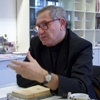 Zemira Alajbegović
Zemira Alajbegović
She received her degree in Sociology at the Faculty of Social Sciences in Ljubljana. From 1982 to 1988 she was leading member of multimedia group FV 112/15 and Disco FV. In the 80’s, she co-founded the independent video production FV video. Between 1983 and 1989, she was member of the group Borghesia. In the 90’s, she was active in the frame of the tandem ZANK (together with Neven Korda). She is author of numerous documentaries, music clips, dance videos, TV TV programmes on arts and culture and video films. Her latest works include the documentaries Between Four Walls and Time Slices that were presented at numerous international festivals, as well as the music clip Vortex. She is currently preparing a documentary film Invisible Territory on Marko Peljhan and a short film Quickly/Slowly. She collaborated on the project Videodocument and in the preparation of programmes on video art in Slovenia. She works as free-lance artist, director and journalist.
Eda Čufer (1961)
Dramaturg, curator and writer. Her texts on theatre, dance, visual arts, culture and politics have been published in numerous publications at home and abroad.
In the 80’s, she collaborated as dramaturg with the director Dragan Živadinov. In 1983, she was co-founder of the Theatre of Sisters of Scipion Nasica. In the 90’s, she collaborated as dramaturg with choreographer Iztok Kovač and his dance company En-Knap as well as with director Marko Peljhan in the frame of Project Atol. Between 1991 and 1999, she collaborated as dramaturg with the group IRWIN on projects that dealt with a new perception and understanding of relations between the West and the East in the period of post-Socialism. In the frame of these projects, she was editor of numerous books and catalogues: NSK Moscow Embassy: How the East Sees the East, 1992; Transnacionala: Highway Collisions Between East and West at the Crossroads of Art, 2000; Interpol: The Art Exhibition Which Divided East and West, 2001. She co-curated the exhibitions: In Search of Balkania, Neue Galerie, Graz, Austria, 2002 and Call me Istanbul, ZKM, Karlsruhe, Germany, 2004 (both together with Roger Conover and Peter Weibl).
 Clémentine Deliss
Clémentine Deliss
is an independent curator, researcher and publisher and was born in London of French-Austrian parents. She holds a PhD from the School of Oriental and African Studies, University of London. Early exhibitions include Lotte or the Transformation of the Object (Steirischer Herbst, Graz, Vienna 1990); Exotic Europeans (National Touring Exhibitions, London, 1990); and Seven Stories about Modern Art in Africa (Whitechapel Gallery, Konsthalle Malmo 1995).
From 1992 to 1995 she was the artistic director of africa95, an artist-led festival coordinated with the Royal Academy of Arts, London and over 60 UK institutions. Since 1996 she has produced the writers’ and artists’ organ Metronome, publishing in Dakar, Berlin, Basel, Frankfurt, Vienna, Oslo, Copenhagen, Stockholm, Paris, London, and Tokyo. Metronome has been launched at the Dakar and Venice biennales; the Kunsthalle Basel; DAAD, Berlin; documenta X; and at Galerie Chantal Crousel in Paris.
In 2005 she founded Metronome Press in Paris together with French critic Thomas Boutoux (www.metronomepress.com). In September 2006, Clementine Deliss had a solo exhibition of her work at Kandada gallery (CommandN project collective,Tokyo), featuring ten years of Metronome and a special edition of sandals made from second-hand books. At the same time she curated the Metronome Think-Tank in Tokyo, which was hosted by the Mori Art Museum and organised by Arts Initiative Tokyo and Edinburgh College of Art. Metronome is an official participant of documenta 12 magazines.
Since 2003 she has directed Future Academy at Edinburgh College of Art with members and research cells in Senegal, India, Australia, USA, and Japan.
She has acted as a consultant for the European Union, AFAA (now Francecultures), the Ministry of Culture, Senegal, and is a member of the scientific research council of the School of Art and Design, Geneva (HEAD).
More information:
www.metronomepress.com
www.futureacademylab.net
 Ješa Denegri
Ješa Denegri
Art critic and Professor of Contemporary Art in Belgrade, where he graduated at Superior Pedagogical School, and later on received his PhD at the Faculty of Philosophy in Belgrade. From 1965 to 1989 he was employed in the Museum of Contemporary Arts in Belgrade. He was member of Editorial Board of the magazines Art, Architecture-Urbanism and Spot as well as Editor-in-Chief of the magazine Moment. He organized numerous exhibitions and was curator for Yugoslavia at the Youth Biennial in Paris and the Venice Biennale.
 Neven Korda
Neven Korda
Studied Sociology at the Faculty of Social Sciences in Ljubljana. From 1982 to 1989 he was the leading member of the theatre group FV 112/15, as well as the Disco FV and the band Borghesia, where he was in charge of the visuals and director of their video clips. In the 80’s, he co-founded the independent production house FV Video that produced numerous artistic, music and documentary video projects. In the 90’s, he continued his creation in the field of artistic video together with Zemira Alajbegović (ZANK) and also worked as video editor, author of TV programmes, director and executor. He is currently entirely dedicated to video: he is the head of independent Pure Video Practice. More at: www.korda-art.si.
 Ženja Leiler
Ženja Leiler
Is a journalist working for the daily newspaper Delo.
 Suzana Milevska
Suzana Milevska
Visual culture theorist and curator and currently works as a Director and Lecturer in Visual Culture at the Visual and Cultural Research Centre “Euro-Balkan” Institute in Skopje. She received her PhD at the Visual Culture Department at Goldsmiths College in London. In 2004 she was a Fulbright Senior Research Scholar at Library of Congress and she also received P. Getty Curatorial Research Fellowship (2001) and ArtsLink Grant (1999). Since 1992 she curated over 70 art projects in Skopje, Istanbul, Stockholm, Berlin, Bonn, Stuttgart, Leipzig, etc. She was one of the curators of the Cosmopolis Balkan Biennial in Thessalonica (2004) and of the International Biennale of Contemporary Art 2005 – National Gallery in Prague. Her publications include “From a Bat’s Point of View” in Eduardo Kac, edited by Peter Tomaž Dobrila and Aleksandra Kostić (Maribor, 2000), 47-58; Capital and Gender, edited by Suzana Milevska (Skopje, 2001); “The Readymade and the Question of Fabrication of Objects and Subjects” in Primary Documents – A Sourcebook for Eastern and Central European Art since the 1950s (New York, 2002), 182-191; “The portrait of an artist as a young ‘strategic essentialist’” in Tanja Ostojić – Strategies of Success / Curators Series 2001-2003, (Belgrade, 2004), 33-43; “Curatorial Labyrinths in Macedonia”, Men in Black – Handbook of Curatorial Practice, Ed. Christoph Tannert/Ute Tischchler, Kűnstlerhaus Bethanien (Berlin, 2004). “Hesitations, or About Political and Cultural Territories” in Cultural Territories, edited by Barbara Steiner, Julia Schäfer and Ilina Koralova (Köln, 2005), 31-43; “Is Balkan Art History Global” in Is Art History Global, edited by James Elkins, (New York, 2006), “Resistance that Cannot Be Recognised as Such – interview with Gayatri C. Spivak” in New Feminism: worlds of feminism, queer and networking conditions, Löcker Verlag (Vienna, in print).
 Miško Šuvaković (1954)
Miško Šuvaković (1954)
Born in Belgrade. He received his Ph.D in 1993 at the Faculty of Fine Arts, University of Arts in Belgrade. He is Professor at the Faculty of Music Art. He teaches Art Theory at Interdisciplinary Studies at the University of Arts. He teaches History and Theory of Contemporary Art as Guest Lecturer at the School of Architecture in Belgrade. He also teaches Performing Arts Theory as Guest Lecturer within the frame of the Philosophy and Theory of Visual Culture programme at the Faculty of Humanistic Studies in Koper. He was member of the conceptualist group 143 (1975-80) as well as member of the informal theoretical community “Community for Space Research “ (1982-89). He participated in the editorial work on the magazines “Catalogue 143” (Belgrade, 1976-77), “Mental Space” (Belgrade, 1982-87), “Transcatalogue” (Novi Sad, 1995-98), “Walking Theory” (Belgrade, from 2001), the magazine “Difference” (Tuzla, 2002), “Sarajevo Notebooks” (Sarajevo, Zagreb, Belgrade, Ljubljana, 2005), “Art Look” (Warszaw, 2006). He is Honorary member of Slovenian Aesthetics Association. He has published the following books: Language Scenes (1989), Pas Tout (1994), Prolegomena for Analytical Aesthetics (1995), Postmodernism (1995), The Asymmetrical Other (1996), Aesthetics of Abstract Painting (1998), Glossary of Modern and Post-modern Visual Arts and Theory after 1950 (1999), Paragrams of body/figure (2001), Martek-Fatal Figures of Artist: Essays on 20th-Century Art and Culture in South-Eastern, Eastern and Central Europe through the work of Vlado Martek (2002), Impossible Histories – Historical Avant-gardes, Neo-avant-gardes, and Post-avant-gardes in Yugoslavia, 1918-1991 (2003), The Politics of Painting (2004), Glossary of Contemporary Art (2005), Discursive Analysis (2006), Case Studies (2006) and Farenheit 387: Theoretical Confessions (2006) etc.